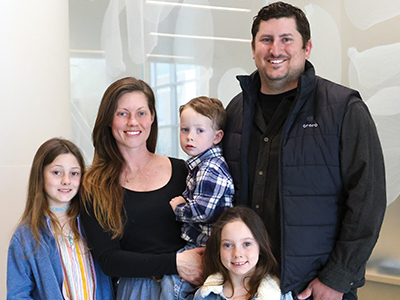
In three short decades, Evan Dansereau has accomplished more than most his age. As if being a pilot, husband, and father to three small children wasn’t enough, Evan never imagined that he’d add yet another formidable title to his name: brain tumor survivor.
“It’s weird how these things happen,” said Evan, speaking of a freak accident that injured one of his beloved dogs and set off a chain of life-changing events that potentially saved Evan’s life. He shared: “My wife and I loved to drive our Jeep into the mountains and let our dogs run. On one of these trips, one of my dogs broke her femur and required emergency surgery. She was doing fine and then suddenly passed the next day. My wife and I were crushed.
I looked at that Jeep as a negative reminder of that day, so I sold it,” said Evan. “What’s crazy is right after that, I was given an opportunity to train for a pilot job I really wanted – had I not sold my Jeep, we wouldn’t have been able to afford the move from Southern California to the job, located in Oregon.” With the proceeds from the Jeep, Evan and his wife decided to pack up the kids and move so he could pursue his passion.
Evan had dreamed of being a pilot his whole life. “It’s the only thing I’ve ever wanted to do, for as long as I can remember,” he said. After years of working in unmanned aviation and as a flight instructor, Evan knew he wanted to finally move onto manned commercial aircraft. In Oregon to do just that, he was forced to be away from home for several weeks at a time while training. “I was fortunate to move through the organization really quickly and shortly after moving to Oregon, I was offered a job on a new aircraft in Spokane. We moved into an RV near my parents’ home in northern Idaho while we saved to buy a home. It was such an incredibly busy time and so many changes happened very quickly; I never dreamed that the exhaustion, nausea and tightness I was feeling in my neck could have been anything other than stress. I thought ‘when this training is over, I need to see a chiropractor.’”
“Evan has always been incredibly busy and it wasn’t unusual for him to have multiple things going on and be traveling a lot,” said Evan’s wife, Lyn. “I just felt like his symptoms were from more than stress. He couldn’t keep anything down and was not himself. He didn’t want to take a day off from his new job but, thankfully, I was able to convince him to go to urgent care.” Evan went into urgent care, but had already made an appointment with a chiropractor later that day. “I was so sure that’s all I needed,” said Evan. After a CT scan administered at urgent care revealed an abnormality, Evan never made it to his chiropractor appointment.
A short few months after beginning his journey from Southern California to northern Idaho, Evan was not flying cargo planes out of Spokane, as he and his family had given up everything to do, but was undergoing brain surgery to remove a tumor at the base of his skull.
“Evan required a surgery to remove a tumor from his cerebellum and brainstem, in a region called the posterior fossa” said Kootenai Clinic neurosurgeon, John McGowan, M.D..
Posterior fossa tumors are located at the base of the back of head where the skull and neck meet. There is limited space in that part of the skull and the tumor can quickly begin to press on very important brain structures. A craniotomy is a surgical technique where a temporary opening in the skull is made to access different parts of the brain. After creating an opening in the skull, neurosurgeons use computer aided stereotactic techniques to pinpoint and remove tumors. Prior to surgery a special MRI or CT scan is performed that creates a 3D map of the brain. “This model is like a GPS map. We use it to assist us in understanding the borders of tumors and it helps us differentiate tumor tissue from normal brain, as frequently they look similar to the naked eye” said Dr. McGowan, who continues, “Stereotactic surgery allows a precision in microsurgery that we once thought impossible. I am happy to say Kootenai Health sits on the cutting edge of implementing stereotactic technology in the operating rooms”.
Thanks to generous donor support of the Kootenai Health Foundation, Kootenai Health has some of the most innovative and precise surgical navigation systems available. Dr. McGowan, a complex brain tumor specialist, was drawn to Kootenai Health Neurosurgery and Spine a couple of years ago. “I wanted to expand my practice at an organization that provided me with the best team, tools and resources possible to help ensure the best outcomes for my patients,” said Dr. McGowan. In fact, it was Dr. McGowan, specifically, who the urgent care provider referred Evan to after seeing an abnormality in his CT scan. “Although I was scared by this diagnosis, it felt good knowing that Dr. McGowan was spoken of so highly,” said Evan.
A week after their first meeting in early September of 2022, Dr. McGowan performed surgery on Evan. His parents, in-laws, wife, and three small children (ages, 3, 7 and 9) waited anxiously, fearing the worst. “Dr. McGowan did not mince words with us prior to my surgery. We were fully aware how many complications could come out of something so intricate; there was a real possibility I wouldn’t be able to swallow, walk, use the restroom, and my speech and vision could be compromised. It was all so terrifying,” said Evan. “First and foremost, I obviously wanted to be healthy but, secondly, I could not imagine being unable to fly and losing the one career I had worked toward my whole life”.
Evan’s surgery lasted 8 hours. After surgery, Dr. McGowan informed the family that he was able to remove all of the tumor but he wouldn’t know if Evan had suffered any neurologic injuries until he was fully awake. The morning after surgery Dr. McGowan examined Evan and happily reported Evan had not suffered any adverse consequences to surgery. “I could just see it in his face,” said Lyn, “he was basically dancing – Dr. McGowan said they could not find any evidence of neurologic complications. None of us could believe it — we were overjoyed!“
“As with any abnormality, it’s beneficial to catch and treat it early, which we were fortunate to do for Evan,” said Dr. McGowan.
Evan sees it a little differently, however. “As strange as it sounds, I really believe that all of these changes were put in my path so I would be in Idaho. Without the injury to my dog, or the sale of my Jeep, or a quick escalation within my new job, I never would have been in Coeur d’Alene and I wouldn’t have had this amazing surgeon on my team. Dr. McGowan saved my life.”
Evan now sees Dr. McGowan every three months for testing and scans. Evan’s tumor was not cancerous and thanks to the skills of a highly-trained surgeon, his care team, and the innovative technology available at Kootenai Health, Evan is happy to report that he has had zero complications and takes no medications. “I see no reason why Evan would not be able to fly again,” said Dr. McGowan.
While Evan waits for clearance from the FAA to take to the skies again, he enjoys spending a lot of time with family and doting on his surviving dog. “It’ so great just soaking up family time. I wouldn’t trade it for all the flying in the world.”
Learn more about Kootenai Clinic Neurosurgery and Spine and Dr. McGowan HERE.
May 11, 2023, Written by Kootenai Health Communications and Marketing Manager, Shannon Carroll


